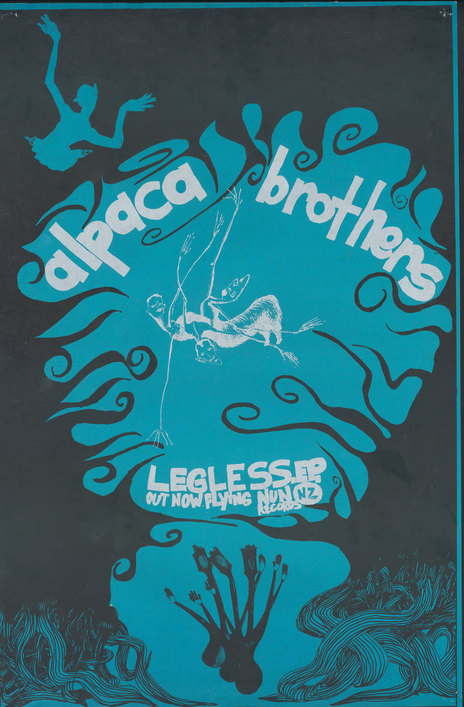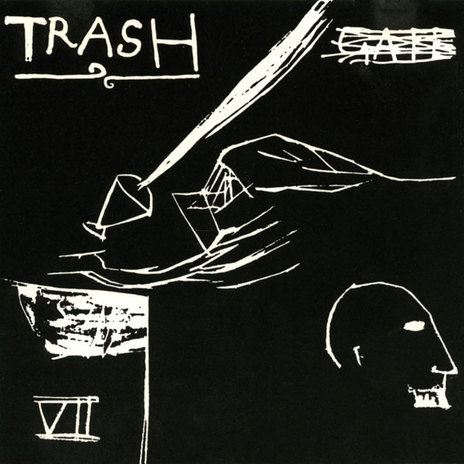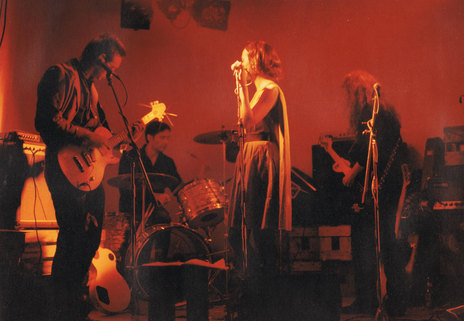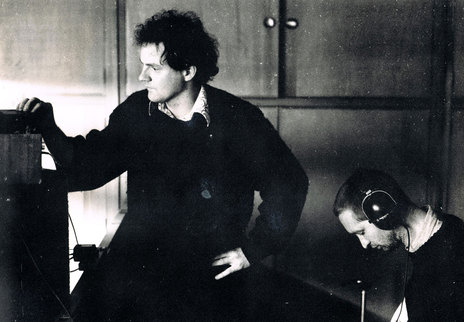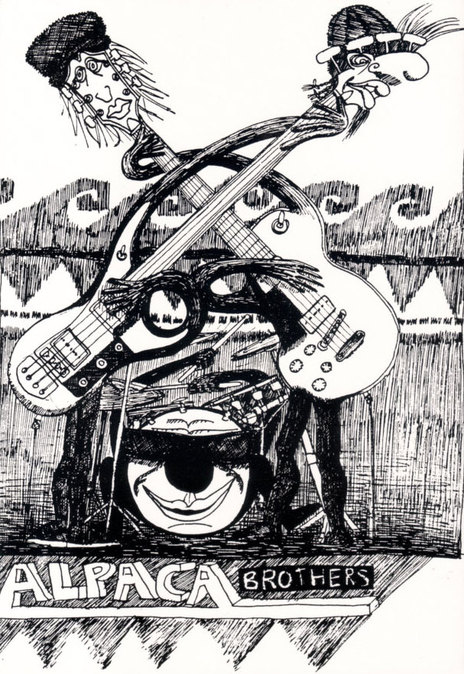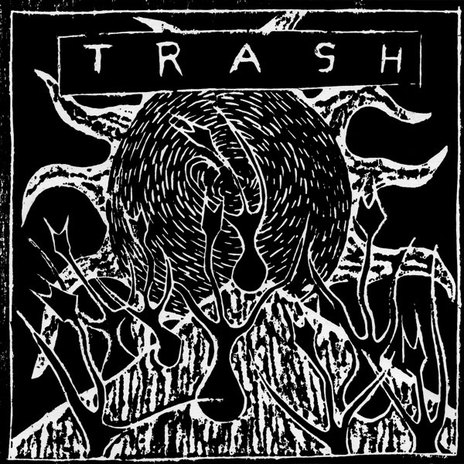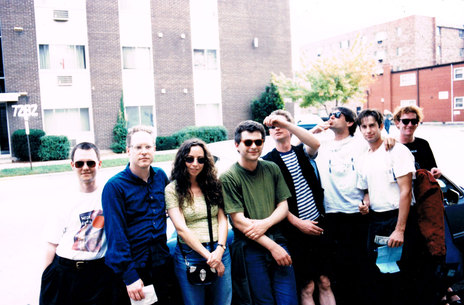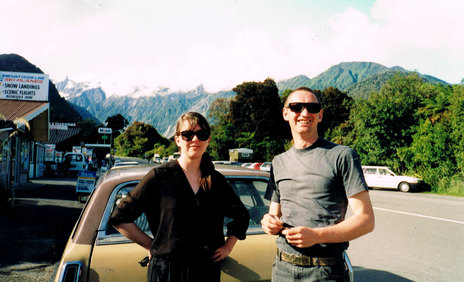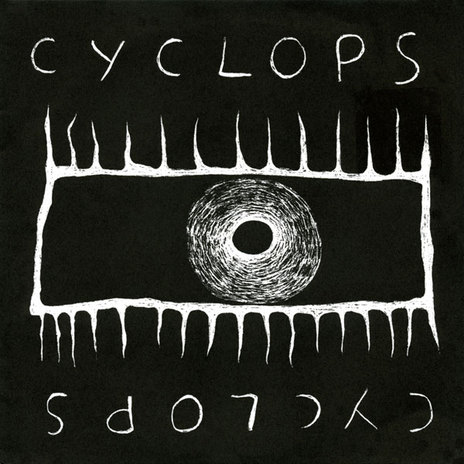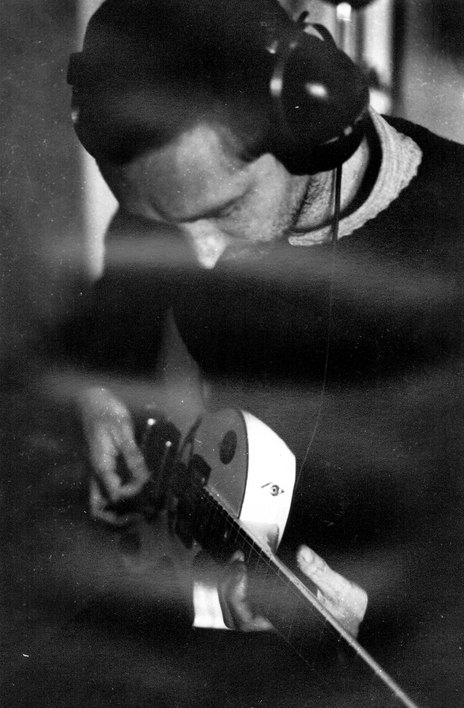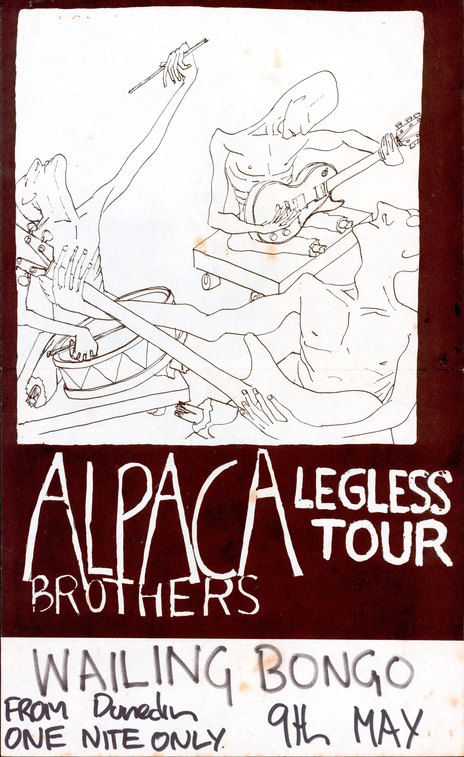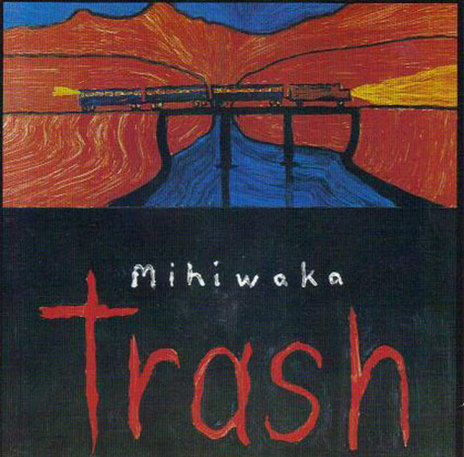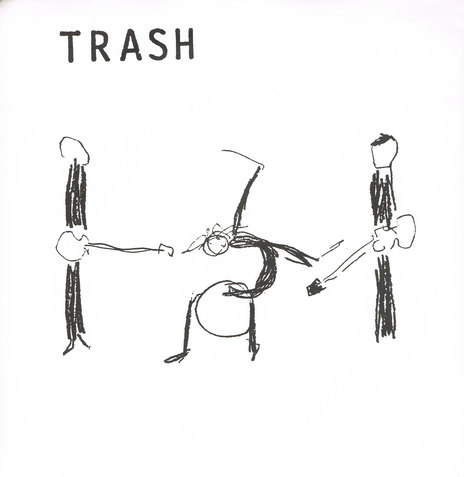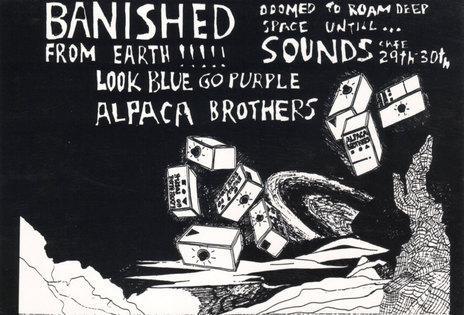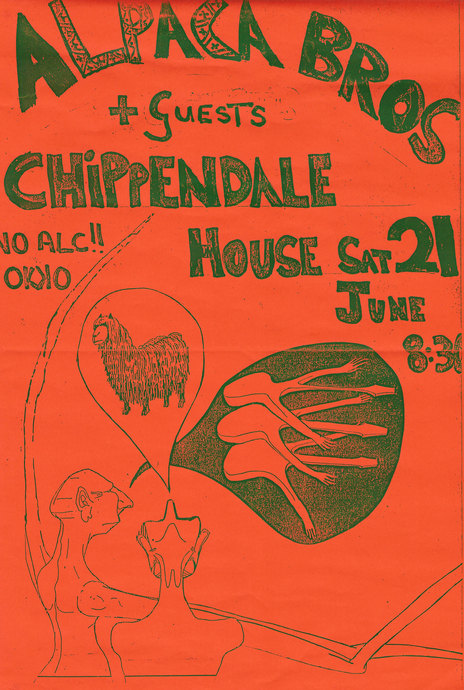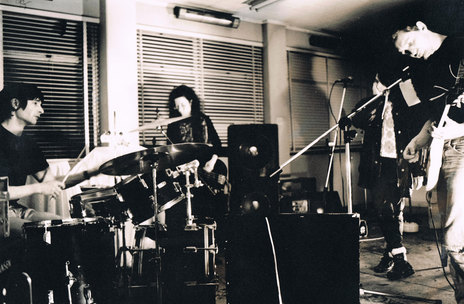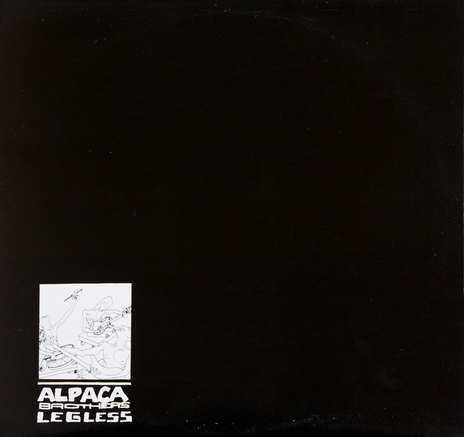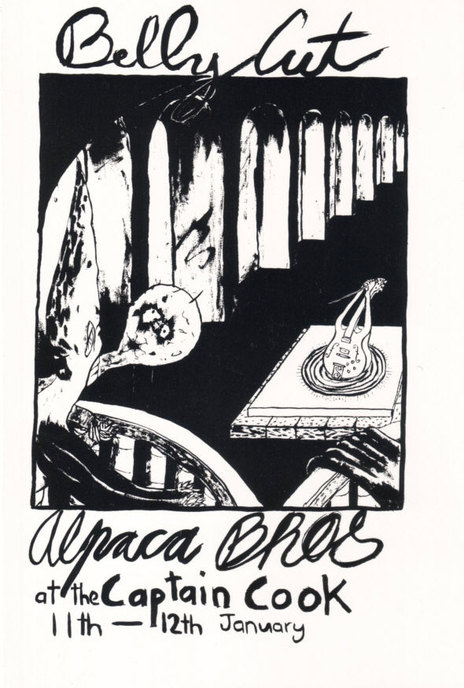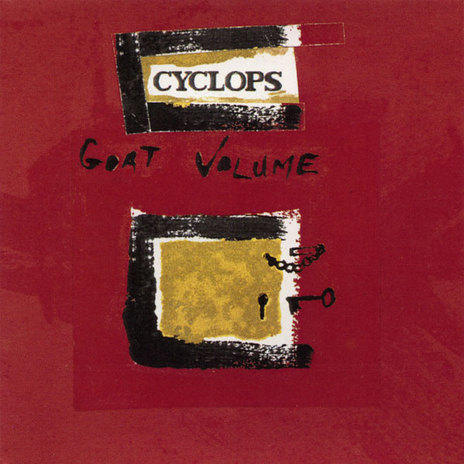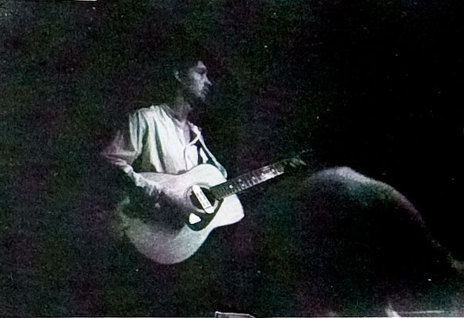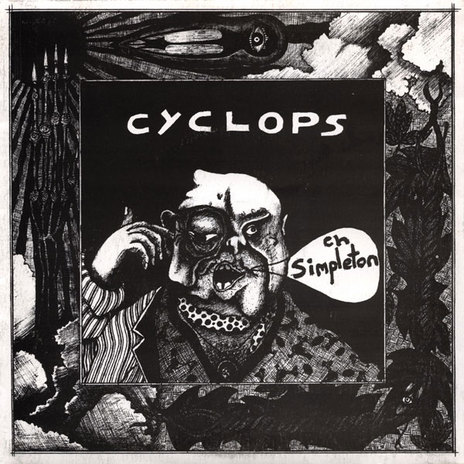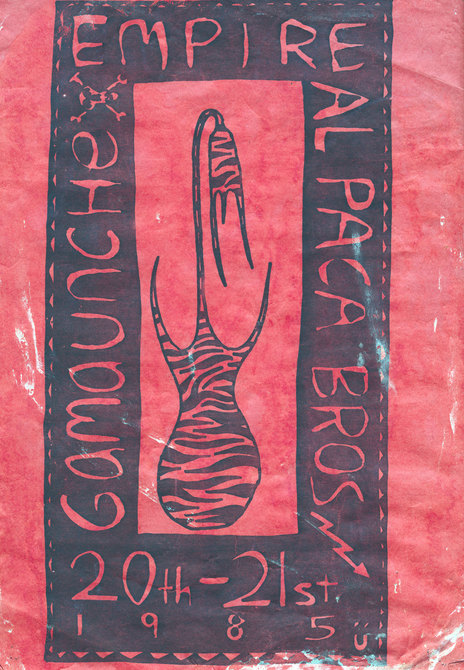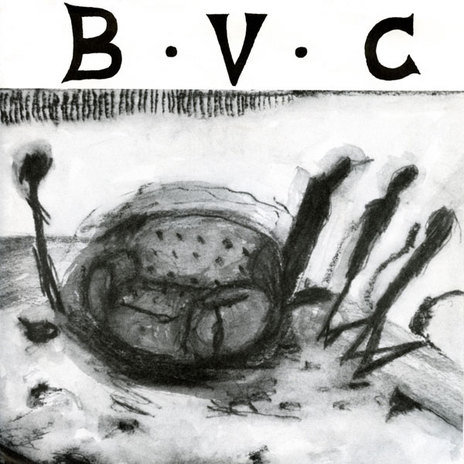The Alpaca Brothers laid down the blueprint for future Blucher recordings. Full on guitar, urgent bass and drums, strained but passionate singing.
By late 1986 the Alpacas were over, and Blucher and Cahill, who both remained on guitar, dispensed with bass and went on to form Trash.
By late 1986 the Alpacas were over, and Blucher and Cahill, who both remained on guitar, dispensed with bass and went on to form Trash. Early live performances saw Geoff Hoani on drums, but he was later replaced by legendary drummer Robbie Yeats. Yeats, who has been in more important Dunedin bands than almost anybody (except maybe Peter Gutteridge), was also in the early years of his membership in The Dead C, a band who would have a seemingly infinite career, producing a massive catalogue.
In contrast Trash would produce only three albums and one 7-inch single. The 7-inch debut, Blucher’s ‘On And On With Lou Reed’ and Cahill’s ‘A Short Poem With The Voice Of William Burroughs In Mind’ was not the first recording the band had made. Earlier sessions with Tex Houston at Dunedin’s Radio One and Victor Grbic at Mascot Studio in Auckland, yielded recordings (some of which had yet to be mixed). But the 7-inch, recorded on a 4-track by Peter Jefferies, and released in 1992 on US label New World of Sound, was the first music by the band to receive a slab of vinyl all to itself.
Propelled by Yeats’ furious drumming and a fiery but somewhat muddy twin guitar assault, Blucher relates the tedium of his current situation. The four walls pull on him, “bottles of shit in the dark scream beneath the clean sacks. Farmers tranquilise their stags, and I desensitise myself. And it’s on and on with Lou Reed, on and on with Lou Reed …" The flip begins with delicate guitar picking, as Cahill reminisces on an absent friend while "surely enjoying this cup of tea", before the band return to the more propulsive thrust and style of the A-side, but this time with Bruce’s strangulated trumpet thrown into the mix. “Sucking on a burning guitar.”
Prior to the single Trash released two songs, ‘Telecom South’ and ‘Migraine’, on the three record box set Killing Capitalism With Kindness, the debut release by newly formed Belgian label Turbulence Records. Killing Capitalism was also issued as a single disc CD and represented the last of the Xpressway based compilations that had begun with Xpressway Pile=Up.
Trash’s association with Turbulence would continue with the release of the band’s first full-length album, Gritt and Butts. Released on LP and CD in 1993, the album pulled together the earlier Houston and Grbic sessions, with new sessions recorded by Blucher and mixed by Peter Jefferies and Stephen Kilroy at Fish St Studios in Dunedin. With guest appearances by Terry Moore (bass), Peter Moerenhout (drums), and John Hill (trumpet) on the final two songs, and the addition of Andre Richardson’s one line chant in 'Black Swan', four songs into the album, Gritt and Butts expanded on the band’s sound, without significantly altering it.
Not Gate, so called because the artwork had the word ‘Gate’ crossed out, became Trash’s second full-length release in 1994, this time on the New World of Sound label. Dunedin label IMD released the band's swansong, Mihiwaka in 1995.
Both of these albums were produced by Brendon Hoffman at Volt Studios, allowing for more tracks and an upgrade in the recording environment. Parts of Gritt and Butts had been recorded in Blucher’s shed.
Running parallel to Blucher’s activities in Trash were Cyclops, a four-piece band that added Kathy Bull (bass), Andre Richardson (vocals), and Peter Jefferies (drums) to Bruce’s lead vocal and guitar. In 1991 they released the 7-inch single ‘Simpleton’ b/w ‘Lunar Fall’ on the US label Feel Good All Over and plans were made to follow this with a five song 12-inch EP, again on the same label. However a change of pressing plant caused delays, and when the test pressing arrived Bruce rejected it. A second attempt was made to cut the disc, but the band remained unhappy, and so the release, comprising the songs ‘Infinite Tick, ’Gurgle Throat’, ‘Steel White Bed’, ‘Push Me Pull You’ and ‘Don’t You Be A Stranger’ was shelved, and a 7” single, ‘Light’ b/w ‘Spolcyc’, was released on New World of Sound the next year.
The earlier material, which had been recorded by Stephen Kilroy at Fish St. studios, was added to, and this continued into 1994. The new location was Volt Studios, and Brendon Hoffman showed considerable skill in stitching the whole thing together to make the band's defining document, which came out as a full length CD on New Zealand label IMD. Titled Goat Volume, it marked the debut of the Dunedin label, which went on to release albums by Bill Direen, Sandra Bell, and Gate, as well as the previously mentioned final release by Trash. However, Hoffman undermined his own efforts on Goat Volume to some degree by approving the CD’s release after having been told by an employee at the pressing plant, who took the trouble to phone him from Canada, that one of the tracks, 'Falling Golden Trumpets’, contained a drop out. This obvious fault caused comment both from distributors and the public.
Bruce had been active on the live front consistently throughout this time, with both Trash and Cyclops performing shows around New Zealand, although Trash was the band that ranged the furthest afield, adding to its reputation considerably with live appearances in Thailand and the USA.
The American shows, undertaken with Peter Jefferies and Mecca Normal in 1994, earned the band considerable praise.
The American shows, undertaken with Peter Jefferies and Mecca Normal in 1994, earned the band considerable praise. Jefferies’ comments on Bruce’s performance at the Knitting Factory in New York show just how far Blucher was prepared to go to deliver on a live set:
“Bruce had a migraine. He gets them really bad at times. The type that make you want to lie quietly in a darkened room with your eyes shut. And here’s his show in NY. Like it’s the one he’s been looking forward to right throughout the tour, and his brain is splitting open. The sheer guts it took to walk over to that Marshall and crank it right up, and then sing at full volume … and it was amazing. Trash sounded incredible that night.”
The shows in Thailand were also memorable, but for somewhat different reasons. Bruce described the reaction: “They didn’t know what hit them.” An understatement, considering the audience's perception of Western music was most likely to range from lightweight pop to reggae.
"The sound of a two guitar band pushing small amps to Mars and back” is a vivid description of both shows, and the overall Blucher aesthetic. When asked what made him take up music Bruce replied, “It was back in 79 – I was at art school with David Kilgour, Hamish Kilgour and Robert Scott (The Clean), and the whole semi-punk thing was happening. I bought a guitar, sat in a cottage for six months, and taught myself to play. It was immediate art, and a great social scene – drinking and pubs."
Cyclops would both compliment and contrast Bruce’s work in Trash. Kathy Bull summed up the band’s outlook. “Our music is a mode of expression. If you were to call it anything it would be heavy and serious. What I mean is, we write from personal experience, as well as wider human rights issues.”
An appearance by Bruce in a supportive roll came with the 1992 release of Sandra Bell’s Dreams of Falling album. Blucher played both electric and slide guitar on the title track. The album was released on LP and CD by Turbulence. Trash also turned into B.V.C. when fronted by Viv Crowe, whose alter ego looked after things at the Empire Tavern. The haunting 7-inch single, 'Once in a Blue Moon' b/w 'Soft October' was released, as their one and only recording, on US label Roofbolt.
It remains the most delicate piece of work undertaken by both Bruce and the band itself.
Bruce Blucher’s recorded output faded during the late 1990s, and he only made live appearances fleetingly from then on. He recorded as Pointy Little Stick on two Arc record compilations, contributing the song ‘The Walk' to the Flying Way Too High compilation, and ‘Aha’ to 1999’s Arclife set, but somewhere around the turn of the century he took up a career as a stonemason.
